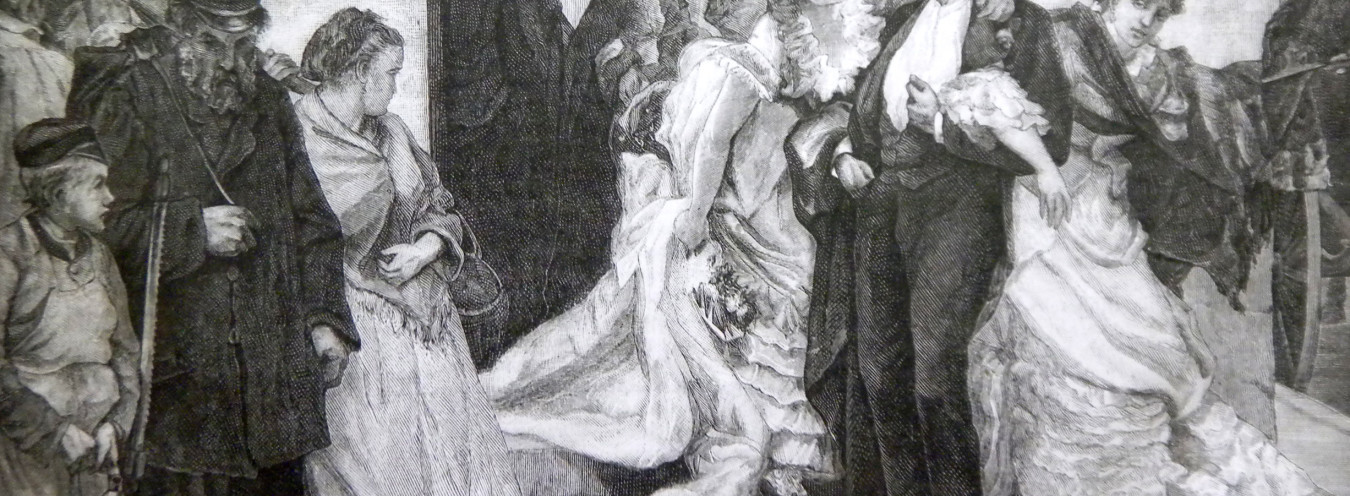
Scandal
[Mraczewski about Wokulski] But as for the stupidities the old man is committing – that’s a disgrace! (319)
Scandal is discussed often and enthusiastically in The Doll. The characters make scandals or fear them, become their victims or contribute to them. Scandal (Latin scandalum: outrage) is a disruption of some social norm, convention, or generally accepted form of behaviour, which causes the public’s anger and indignation. “Scandal” denotes behaviour that violates the accepted rules, that is incomprehensible or embarrassing – this especially concerns women, who have reputations to uphold. Ignacy Rzecki worries about how Helena Stawska might be affected by Baroness Krzeszowska, who constantly lurks in the window opposite and spies on Stawska: scandal would result from all this peeping – and indeed, the fact that Stawska and the toy are taken to the police station (the first act of the doll trial) is deemed [a] scandal, a dreadful scandal! by the outraged agent Wirski. Here the scandal is the accusation of theft, which puts the impecunious single woman earning a living by giving lessons at risk of losing her job.
In Prus’s world, however, scandal is, above all, connected to the sphere of eroticism, frequently concealed; when it is revealed, it becomes scandalous. Scandal is exactly that: a revealed secret. Leading a prostitute he met in a church to the shop, Wokulski sees passers-by giving them lingering looks on the street, and silently calls himself a fool: Never mind the scandal, but what sort of ideas have I got into my head? Discreetly using a prostitute’s services is not discreditable to a rich merchant – but talking to her in public definitely is. Similarly, after his break-up with Izabela, the upset merchant spends most of his time at home, afraid that on the street despite himself he would cause some ridiculous incident. As far as infidelity is concerned, the high society ladies do not consider it a scandal, but it becomes one when revealed (Kazimiera Wąsowska is outraged by Baron Dalski who, wanting a divorce, spreads stories of his wife’s betrayal: He demanded a separation from his wife, and had a duel with Starski in order to make the scandal still more notorious). Izabela Łęcka is of the opinion that on the day of the races the defeated Baron Krzeszowski lost control of himself and behaved scandalously when he rushed to her carriage.
However, the novel also sometimes construes “scandalous” situations in original and frequently rather comical ways. Two young people’s tête-à-tête without a chaperone, even when devoted to the worthy cause of teaching meteorology (a lesson which Julian Ochocki was to give to Felicja in Zasławek) immediately sparks suspicion and protest from Kazimiera Wąsowska; the irritated scientist replies, You are always making difficulties. Seeing a butler carry the meagre possessions (a suitcase and an umbrella) of her husband on his return to the fold of the family, Baroness Krzeszowska wrings her hands – and it is the servant who takes her to task for it: Pray don’t create a scene in front of the servants, madam. Ignacy Rzecki frequently writes about scandals with his tongue firmly in his cheek, for example, when recalling the particular relationship between the Mincel brothers and the “scandal” at Jan’s wedding: he had equipped himself for the ceremony in an amaranthine overcoat with split sleeves, yellow top-boots and a sabre, whereupon Franz announced he would not tolerate such a masquerade at a wedding, even if he had to complain to the police. On this, Jan vowed he would kill the informer if he caught him, and for the wedding breakfast he donned the attire of his ancestors, the Mientuses. Nonetheless, even Rzecki himself unwittingly becomes the object of such public outrage when he appears at the theatre in an unfashionable top-hat and tie, a dark-green frock coat, and check trousers; this attire prompts astonishment and malicious comments: And just look at the trinkets on his watch-chain! How disgraceful!
→ Humour; → Aesopian language; → Marriage;
Bibliografia
- H. Szabała, Skandal w kulturze, in Wobec kryzysu kultury. Z filozoficznych rozważań nad kulturą współczesną, ed. L. Grudziński, Gdańsk 1993.



